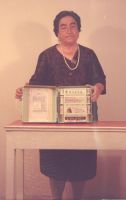Angela Ruiz Robles
Biography
She was born in 1895 in a town in León, northern Spain. A teacher by profession, her vocation for and interest in social issues (she taught in disadvantaged households) earned her recognition, and in 1950 she was awarded the Cross of the Civil Order of Alfonso X the Wise. In addition to her educational mission, Angela invented the Automatic Book (Máquina Taquimecanográfica), considered the precursor of the e-book.
Fields of influence
Dedicated to teaching and motivated by altruism, her work was always fundamentally inspired by her abiding desire to improve and innovate in the field of education and teaching. However, it was in the field of invention where she achieved most recognition, inventing a scientific and grammatical atlas of Spain that combined geographical information about Spain with Spanish grammar, syntax, morphology, spelling and phonetics, and the Automatic Book (Máquina Taquimecanográfica), a Mechanical Encyclopaedia considered the precursor of the e-book, which earned her several awards and national and international recognition, including the Oscar for invention at the Official and National Fair of Zaragoza (1957), the Bronze Medal at the International Exhibition in Brussels (1957), the Bronze Medal for educational innovation in Brussels (1958), the Silver Medal at the International Exhibition of Inventions in Brussels (1963), a Diploma and Medal at the Seville Exhibition (1964) and the Geneva Medal for Spanish inventors (1968).
In the 1960s, the Automatic Book (Máquina Taquimecanográfica), or Mechanical Encyclopaedia, invented and patented by Angela was manufactured under her direct supervision in military workshops located in Ferrol. It consisted of two parts: the first covered basic skills such as reading, writing and numbers, whilst the second operated with a system of with reels, each devoted to one subject using sound in the explanations. All this was housed beneath an unbreakable, transparent sheet of magnifying glass, and incorporated a light for reading in the dark. The Automatic Book (Máquina Taquimecanográfica) was the size of an easily held, lightweight book. It was such an outstanding invention that attempts were made from Washington to buy the patent, but she refused. Today, her invention is sometimes referred to as the first electronic book (e-book). Angela anticipated the era of smart boards in order to reduce the weight of student backpacks, make learning more interesting and adapt teaching to student needs.
Biography
1895: she was born in Villamanin (Leon), the daughter of a pharmacist, and studied at the School of Education in Leon.
1915-1916: she taught her first classes in shorthand, typing and commercial accounting.
1918-1928: she was appointed teacher in a village near Ferrol, Santa Uxia of Mandi, in 1918.
1928: she received a special award for her merits in recognition of her dedication and altruism.
1934: she managed the National School for Orphaned Girls.
1938: she published her first three books: the Compendium of Spanish Spelling, Spanish Spelling and Modern Abbreviated Marti Shorthand.
1944: she designed a Scientific and Grammatical Atlas of Spain, which combined geographical information about Spain with Spanish grammar, syntax, morphology, spelling and phonetics.
1945: she taught at the free Workers' School.
1946: she was head of the free Workers' School and the Adult Education School, where she taught candidates for the customs, postal and telegraph services and people wishing to take advanced commercial studies at the Adult Education School, and had published 16 books on teaching.
1947: she was awarded the Cross of the Civil Order of Alfonso X the Wise in recognition of her social and educational innovation throughout her professional career
1948: she taught shorthand, spelling, grammar and typing in the Ibanez Martin College
1949: she invented the Automatic Book (Máquina Taquimecanográfica).
1959: she was head of the Ibanez Martin College until her retirement. She was also appointed delegate manager of the Spanish Inventors' Association in Galicia.
1973: she was appointed provincial head of the International Federation of Inventors.
1975: she died in Ferrol (La Coruña).
Bibliography
- Marchamos: Revista de Comunicación Interna de la Oficina Española de Patentes y Marcas. 2010, n. 39. http://www.oepm.es/comun/documentos_relacionados/Publicaciones/Marchamos/numero39.pdf
- Ferrol en Femenino II: Primeiros pasos na Educación das Mulleres en Ferrol do século XVIII ao XX". A Coruña: AGN, 2010.
Photo:
- Ruiz Robles's Family. CC0 1.0. Wikimedia Commons. http://commons.wikimedia.org/wiki/File:%C3%81ngela_Ruiz_Robles_con_la_Enciclopedia_Mec%C3%A1nica.jpg.




